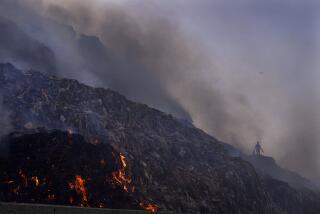Servings at World Table Get Smaller : Cropland and fisheries are less productive, experts warn. But each year the planet has 91 million more mouths to feed.
WASHINGTON — The world’s 5.47 billion people are sharing a dinner table that is slowly shrinking, according to agronomists and environmental researchers. And as 91 million more crowd in per year, the world’s farms, ranches and fisheries are putting less and less on their plates.
Degradation of the world’s cropland and grazing fields and depletion of its fisheries--as well as an ominous decline in the effectiveness of fertilizers--are beginning to slow and in some cases reverse the growth of food supplies that has steadily reduced world hunger since the 1950s.
That is the warning issued by a Washington-based research organization, the Worldwatch Institute, and echoed by United Nations experts.
The trends raise a fundamental question, said Edouard Saouma, director general of the U.N.’s Food and Agriculture Organization: “Are we going to have enough good land to feed the extra 2.6 billion people who will be on this planet by the year 2025?”
According to Worldwatch Institute’s latest publication, “Vital Signs: The Trends That Are Shaping Our Future,” world grain output per person, which climbed 40% between 1950 and 1984, has fallen 8% over the last eight years. After a rise of 78% over 40 years, world meat production per person has declined nearly 1% in the past two years. And the catch of fish, which more than quadrupled from 1950 to 1990, has dropped by 7% in three years.
“The needs of the 91 million being added each year can be satisfied only by reducing consumption of those already here,” Worldwatch Institute Director Lester R. Brown wrote in the foreword of “Vital Signs.”
Trends in U.S. food production, in some cases, have worsened the world’s situation. While the United States has long been a leading exporter of such foodstuffs as wheat, exports of the grain have stopped growing, even as the Third World clamors for more.
The reasons for the worldwide decline in production follow a clear pattern: All appear to be the result of reckless exploitation of land and ocean resources.
Oceangoing fishing fleets have netted such high yields that dinner-table staples like cod, mackerel and tuna cannot sustain their populations.
The U.N.’s Food and Agriculture Organization now lists virtually every major commercial species of fish as depleted, fully exploited or over-exploited.
Last month, the United Nations called an international conference to discuss how and whether the fish populations could be nursed back to health. It broke up without reaching any conclusions--with countries operating open-ocean fishing fleets and those that fish mainly in territorial waters at loggerheads.
The apparent downturn in meat production comes from a different sort of environmental breakdown.
The grasslands that nourish cattle and sheep are being pushed to capacity on every continent, including North America, experts have concluded. Because much of it has been overgrazed, the soil has eroded and been robbed of nutrients, which stunts the growth of grasses and eventually turns the grazing range into desert.
The loss of cultivable land to soil degradation also appears to have contributed to a depression in the growth of grain harvests worldwide.
The amount of land used to produce grain had been increasing slowly from 1950 until 1981, when it came to an abrupt halt. And the growth of irrigated land worldwide has fallen since 1978 due to a spreading scarcity of fresh water.
Meanwhile, farmers have discovered that crop yields for grains are falling as overworked soil becomes depleted of nutrients. “Vital Trends” noted that farmers used ever-larger quantities of fertilizers to raise the productivity of grain fields by 3% yearly from 1950 to 1984. But as farmers in the United States and Western Europe have learned that more fertilizer no longer brings higher yields, their use of it has leveled off.
Earth’s Troubled Harvests
The output of grain, fish and meat per person has declined recently, a trend blamed on exploitation of land and ocean resources worldwide.
GRAIN: Harvest down 8% in eight years.
MEAT: Production down 1% in two years.
FISH: Catch down 7% in three years.
Source: Worldwatch Institute’s “Vital Signs: The Trends That Are Shaping Our Future”
More to Read
Sign up for Essential California
The most important California stories and recommendations in your inbox every morning.
You may occasionally receive promotional content from the Los Angeles Times.











